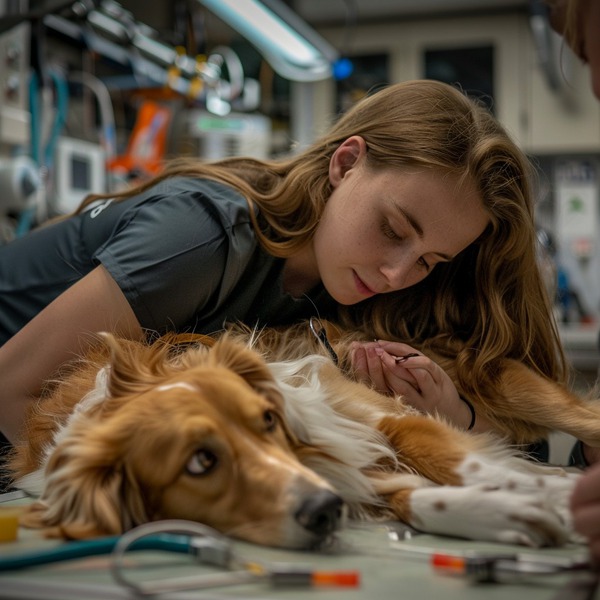When our beloved pets face sudden health issues, there is an understandable rush to provide them with immediate medical attention, often resulting in emergency vet visits. These visits can be daunting and emotionally charged as pet owners deal with the anxiety of seeing their furry friends in distress. Emergency vets are equipped to handle an array of urgent health crises, ranging from traumatic injuries to severe illnesses such as seizures, poisoning, or respiratory difficulties.
Emergency vet visits can sometimes result in hospitalization for your pet, and understanding the reasons behind this decision is crucial for pet owners. Here’s an in-depth exploration of why hospitalization might be necessary:
1. Continuous Monitoring and Care
Certain conditions require round-the-clock monitoring and care, which cannot be adequately provided at home. Pets with severe injuries, critical illnesses, or those recovering from significant surgeries need constant observation to ensure they remain stable and to address any complications that may arise quickly. An emergency animal hospital allows veterinarians to closely monitor vital signs, administer medications, and provide necessary interventions at any moment.
2. Advanced Diagnostic Testing
Some emergencies necessitate advanced diagnostic tests that take time and specialized equipment. These tests, such as blood work, ultrasounds, CT scans, or MRIs, help determine the underlying cause of the pet’s condition. Hospitalization allows vets to conduct these tests without delay, ensuring accurate diagnosis and timely treatment. Staying in the hospital also allows repeated testing to monitor the pet’s progress and adjust treatments as needed.
3. Intensive Care and Treatment
Pets experiencing severe health issues, such as trauma, poisoning, organ failure, or severe infections, often require intensive care. This can include IV fluids, oxygen therapy, pain management, and other life-saving treatments. Veterinary hospitals are equipped with the necessary technology and staff to provide this level of care, which is vital for stabilizing and supporting critically ill pets.
4. Post-Surgical Recovery
After major surgery, pets may need to stay in the hospital to recover safely. Hospitalization ensures that they receive appropriate pain management, wound care, and monitoring for potential post-surgical complications like infections or adverse reactions to anesthesia. This controlled environment allows for a smoother recovery process and reduces the risk of complications that could arise if the pet were sent home too soon.
5. Administration of Specialized Treatments
Specific treatments require specialized administration that can only be provided in a hospital setting. This includes intravenous medications, blood transfusions, and other advanced therapies. These treatments often require precise dosing and continuous monitoring to ensure effectiveness and safety, which are best managed in a veterinary hospital.
6. Nutritional Support
Younger pets who are severely ill or injured may be unable to eat or drink independently. Hospitalization, especially at a puppy hospital in Punta Gorda, FL, allows veterinarians to provide nutritional support through feeding tubes or intravenous nutrition. This support is crucial for maintaining the puppy or kitten’s strength and aiding its recovery while addressing the underlying health issues.
7. Pain Management
Effective pain management is essential for pets in critical condition or recovering from surgery. Veterinary hospitals have access to a range of pain relief options, including medications and advanced techniques such as epidural anesthesia or constant rate infusions. Hospitalization ensures that pets receive the appropriate level of pain control to keep them comfortable and aid in their healing.
8. Management of Complications
Emergencies can lead to unpredictable complications that require immediate intervention. Hospitalization provides a controlled environment where veterinarians can quickly address any sudden changes in the pet’s condition. Whether it’s a drop in blood pressure, respiratory distress, or an unexpected reaction to treatment, having the pet in the hospital allows for rapid response and potentially life-saving measures.
9. Isolation for Contagious Diseases
Pets with contagious diseases, such as parvovirus or certain respiratory infections, need to be isolated to prevent the spread of the illness to other animals. Veterinary hospitals have isolation units designed to provide the necessary care while keeping other pets safe. Hospitalization in these cases is essential for the affected pet’s treatment and public health.
10. Support for Long-Term Conditions
Some emergencies reveal long-term health conditions that require ongoing management. Hospitalization at the Animal Hospital at Babcock dog wellness check allows veterinarians to stabilize the pet and develop a comprehensive treatment plan before sending it home. This may include adjusting medications, establishing a care routine, and educating pet owners on managing the condition effectively.
Final Thoughts
Hospitalization during an emergency vet visit is often necessary to provide the care that critically ill or injured pets require. It ensures continuous monitoring, advanced diagnostics, intensive care, post-surgical recovery, and specialized treatments. Hospitalization facilitates nutritional support, pain management, complication management, infectious disease isolation, and support for long-term conditions. By entrusting your pet to a veterinary hospital, you ensure they receive the best care to aid their recovery and overall well-being.


